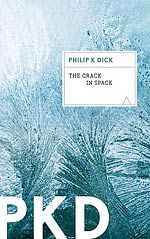
![]() attackofthebooks
attackofthebooks
3/13/2015
![]()
There's a good chance that you know Philip K. Dick, if not by name, then by the movies his books and stories have spawned. He's that rare author with as many ten of his stories or novels adapted for the big screen, albeit posthumously. Think Blade Runner, starring Harrison Ford, an adaptation of Dick's brilliant Do Androids Dream of Electric Sheep? or Total Recall, with Arnold Schwarzenegger, from We Can Remember It For You Wholesale. More recent movies include The Adjustment Bureau and Minority Report.
Ironically, Dick lived his live in near poverty. As an homage to his influence, the Library of America included Dick in their "quasi-official national canon" in 2007, the first science-fiction writer to be included.
I was introduced to Dick through his movies and later picked up the novels and short stories they were based on. In contrast to much of what is classified as science-fiction, Dick's stories and novels focus on human nature and the effect of technology and science on our character and relationships.
The Crack in Space, written in 1966, tackles parallel universes, time travel, gaps in the time-space continuum, and, to make things interesting, racism.
From the back of the book:
When a repairman accidentally discovers a parallel universe, everyone sees it as an opportunity, whether as a way to ease Earth's overcrowding, set up a personal kingdom, or hide an inconvenient mistress. But when a civilization is found already living there, the people on this side of the crack are sent scrambling to discover their motives. Will these parallel humans come in peace, or are they just as corrupt and ill-intentioned as the people of this world?
Compared to some of his other novels, The Crack in Space is not the most exciting tale in the Philip K. Dick canon. In addition to a parallel universe, it weaves in the candidacy of a America's first black presidency. That's not so controversial now, but writing in the 1960s, during the civil rights movement, Dick was predicting what was then almost impossible to conceive. Other issues addressed include population growth and control, scarce resources, and the morality of sexual promiscuity. The story is interesting, if a bit dated. It"s a worthy, if not gripping, read for a quiet weekend.
http://www.attackofthebooks.com/review-the-crack-in-space-by-philip-k-dick/